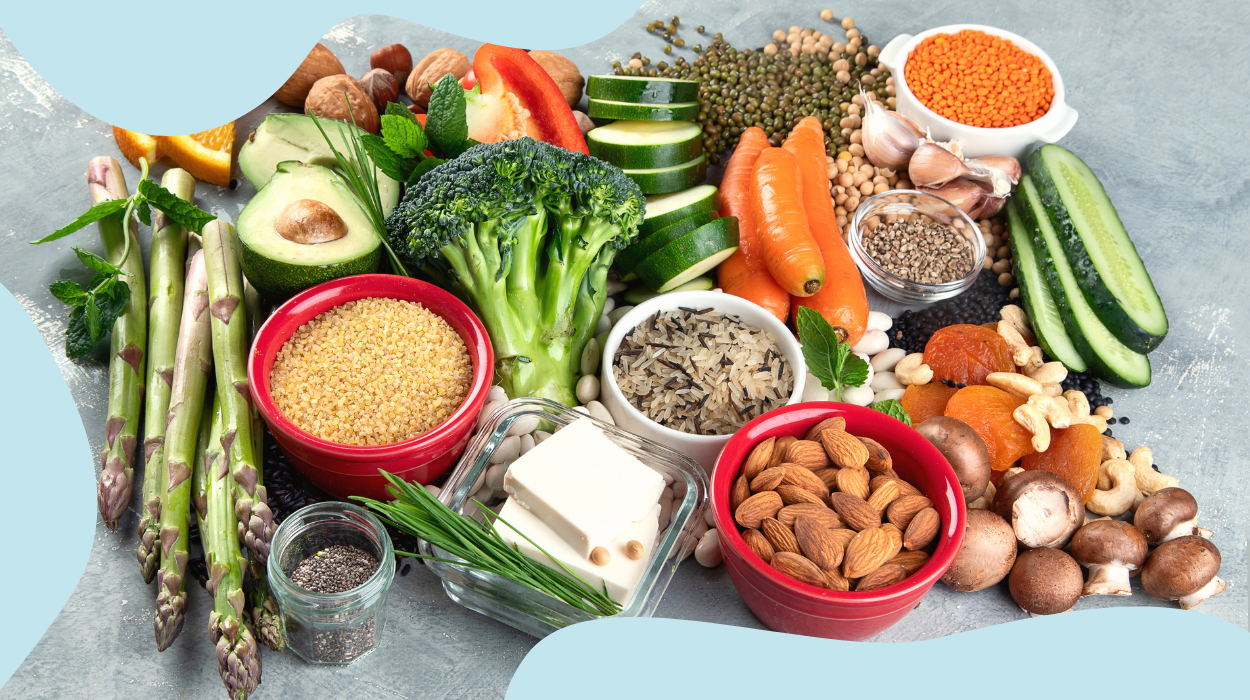List Of Plant-Based Foods: Risks & Benefits In 2024

Unlock the power of plant-based nutrition as we delve into the vast array of benefits and possibilities that come with adopting a plant-based diet. The plant-based diet is packed with vibrant fruits, nourishing vegetables, wholesome grains, and protein-rich legumes, this dietary approach offers many health advantages while promoting environmental sustainability.
In this article, we will explore the wonders of plant-based eating, from its potential to improve overall well-being to its positive impact on the planet. Join us as we examine a list of plant-based foods in detail and their associated risks.
Is A Plant-Based Diet Good For Your Health?
Yes, a plant-based diet can benefit your health.
Plant-based diets are typically abundant in nutrient-dense fruits, vegetables, whole grains, legumes, and nuts, which provide essential vitamins, minerals, and fiber.
By focusing on plant-based foods, individuals may experience improved digestion, weight management, and reduced risk of chronic diseases.
What Is A Plant-Based Diet?
A plant-based diet[1] is an eating pattern that emphasizes whole, minimally processed foods derived from plants, such as fruits, vegetables, grains, legumes, nuts, and seeds. It is centered around consuming predominantly plant-based foods[2] while minimizing or excluding animal products, including meat, poultry, fish, dairy, and eggs.
Plant-based diets have gained considerable attention due to their potential health benefits and positive environmental impact. Plant foods offer various nutrient-dense options that provide essential vitamins, minerals, fiber, and antioxidants.
This eating approach promotes a higher intake of plant-based proteins, healthy fats, and complex carbohydrates while reducing the consumption of saturated fats and cholesterol.
In addition to potential health advantages, a plant-based diet can contribute to sustainable food practices. Plant-based eating reduces the environmental footprint[3] associated with animal agriculture, including greenhouse gas emissions, water usage, and land degradation.
Overall, a plant-based diet proffers a flexible and inclusive approach to healthy eating, promoting the consumption of diverse plant foods while reducing reliance on animal products.
Benefits And Risks Of Plant-Based Diet
A plant-based diet offers various benefits for both individuals and the environment. But it is important to be aware of this dietary approach’s potential risks and challenges. The following are the benefits and risks of a plant-based diet in detail.
Benefits
Nutrient-Rich
Plant-based diets are naturally abundant in vitamins,[4] minerals, fiber, fatty acids, and antioxidants. The wide array of fruits, vegetables, whole grains, legumes, nuts, and seeds provide essential nutrients that promote overall health and well-being. These nutrient-dense foods can support optimal body functioning, boost the immune system,[5] and reduce the risk of chronic diseases.
Weight Loss
Plant-based diets for weight loss tend to be lower in calories and saturated fats than those that include animal foods. The emphasis on whole, unprocessed plant foods can aid in weight loss and reduce the risk of obesity.
The high fiber content of plant-based diets also promotes satiety,[6] helping individuals feel fuller for longer periods and potentially reducing overall calorie intake.
Heart Health
Plant-based diets have been linked to improved heart health and reduced occurrence of heart diseases. They are typically low in cholesterol and saturated fats, commonly found in animal products.
By incorporating plant-based foods like pumpkin seeds, individuals can reduce their intake of unhealthy fats and increase their consumption of heart-healthy fats, such as those found in avocados, nuts, and seeds. These plant-based diets have been associated with lower blood pressure, reduced cholesterol levels, and a decreased risk of heart disease.[7]
Reduced Risk Of Chronic Diseases
Research suggests that plant-based diets may lower the risk of various chronic diseases, including type 2 diabetes,[8] certain cancers, and age-related macular degeneration. The abundance of fiber, antioxidants, and phytochemicals found in plant foods, including sweet potatoes and other plant-based sources, contribute to their protective effects.
Additionally, plant-based diets often promote a healthier body weight, which is another important factor in reducing the risk of chronic diseases.
Digestive Health
The high fiber content in plant-based diets supports digestive health.[9] Fiber from foods such as starchy vegetables, whole grains, fresh fruits, and legumes adds bulk to the diet, aiding in regular bowel movements and preventing constipation. It also fuels beneficial gut bacteria, promoting a healthy gut microbiome.
Including a variety of plant-based foods in your diet can ensure you get an ample amount of dietary fiber, which is essential for optimal digestive function.
Environmental Sustainability
Plant-based diets have gained recognition for their positive environmental impact. Animal agriculture significantly contributes to greenhouse gas emissions, deforestation, and water pollution. On the other hand, plant-based diets require fewer natural resources, such as land, water, and feed, making them more sustainable and eco-friendly.
Reducing the consumption of animal products can help mitigate these environmental concerns.
Risks
Nutrient Deficiencies
While plant-based diet foods, including a vegan or vegetarian diet, offer a wealth of nutrients, certain micronutrients may be more challenging to obtain solely from plant sources. Key dietary supplements like vitamin B12, iron, zinc, and omega-3 fatty acids are primarily found in animal-based foods.[10]
So individuals following a plant-based diet need to ensure they meet their nutritional needs through fortified foods or supplements, as regular monitoring of nutrient levels is essential to prevent deficiencies.
Protein Sources
Protein is a crucial macronutrient,[11] and plant-based diets require careful selection and combination of protein sources to ensure adequate intake of all essential amino acids. While many plant foods provide protein, it is important to incorporate a variety of plant-based protein sources such as legumes, quinoa, nuts, and even vegan protein bars to obtain a complete amino acid profile.
Food Availability And Accessibility
Access to a wide range of plant-based whole foods may vary depending on geographic location, socio-economic factors, and individual circumstances
In some areas, fresh produce and plant-based alternatives may be limited or more expensive.[12] This can present challenges in maintaining a diverse and balanced plant-based diet, but it is possible to find suitable options with proper planning and resourcefulness.
Social Implications
Adhering to a plant-based diet may present social challenges in certain situations. Dining out, attending social gatherings, or sharing meals with friends and family members who follow different dietary patterns can sometimes be difficult. Communicating your dietary preferences and finding supportive environments that accommodate your choices is important.
Consulting with a healthcare professional or registered dietitian is recommended to ensure a well-balanced plant-based diet that meets individual nutritional needs.
Plant-Based Foods List
Here is a comprehensive list of plant-based and whole foods that can be incorporated into a plant-based diet:
- Fruits (Apples, bananas, oranges, berries, grapes).
- Vegetables (Leafy greens, broccoli, cauliflower, sweet potato, carrots).
- Whole Grains (Quinoa, brown rice, oats, barley, buckwheat, millet).
- Legumes (Chickpeas, lentils, black beans, kidney beans).
- Nuts and Seeds (Almonds, walnuts, cashews, pistachios, sunflower seeds).
- Plant-based Proteins (Plant-based protein powders, seitan, nutritional yeast, plant-based meat alternatives like tofu and tempeh).
- Healthy Fats (Avocado, olives, olive oil, coconut oil, flaxseed oil).
- Dairy Alternatives (Fortified plant-based milks such as almond, soy, coconut, oat, and cashew milk).
- Herbs and Spices (Basil, cilantro, oregano, rosemary, turmeric, cinnamon, cumin).
- Condiments (Salsa, hummus, guacamole, mustard, balsamic vinegar, soy sauce).
This list provides a starting point for incorporating plant-based foods into your diet. You must focus on variety, balance, and nutrient density to ensure a well-rounded and nourishing plant-based eating plan.
A personalized diet can also be achieved with these options in cases of individuals seeking specialized diets, such as a plant-based diet for diabetes.
The Bottom Line
Adopting a plant-based diet can provide many health benefits and contribute to a sustainable lifestyle. Incorporating diverse plant-based foods into your meals, such as vibrant fruits, nourishing vegetables, whole grains, legumes, and nuts, can offer a nutrient-rich and satisfying diet.
Whether you savor the flavors of nature’s bounty or explore innovative alternatives, embracing a plant-based lifestyle offers a world of culinary possibilities while promoting your and the planet’s well-being. So, embark on this plant-powered journey and discover the joys of nourishing your body with the goodness of plants.
Frequently Asked Questions
Apples, bananas, oranges, berries, spinach, kale, broccoli, carrots, bell peppers, tomatoes, quinoa, rice, oats, lentils, chickpeas, green peas, almonds, walnuts, chia seeds, flaxseeds, grilled tofu, tempeh, avocado, nut butters, coconut milk, almond milk, soy milk, cruciferous vegetables, hummus, and whole wheat bread.
The most common plant-based foods include fruits, vegetables, whole grains, legumes, nuts, and seeds. These form the foundation of a plant-based diet and offer a wide range of essential nutrients, fiber, and antioxidants to support a healthy lifestyle.
A plant-based diet typically excludes animal products, including eggs, but the level of strictness can vary among individuals. Some people may include eggs in their plant-based diet, while others follow a strict vegan approach that avoids all animal products.
A well-planned plant-based diet can provide all the necessary nutrients for children’s growth and development.
Yes, plant-based protein sources like legumes, tofu, tempeh, and quinoa can provide ample protein when consumed in sufficient quantities.
Since vitamin B12 is primarily found in animal products, it’s important for those on a plant-based diet to supplement or consume fortified foods to meet their B12 needs.
Yes, many athletes thrive on a plant-based diet, as it can provide the necessary energy, protein, and nutrients to support athletic performance.
Plant-based diets are often associated with weight loss due to their emphasis on whole, unprocessed foods and higher fiber content.
+ 12 sources
Health Canal avoids using tertiary references. We have strict sourcing guidelines and rely on peer-reviewed studies, academic researches from medical associations and institutions. To ensure the accuracy of articles in Health Canal, you can read more about the editorial process here
- Hever, J. (2016). Plant-Based Diets: A Physician’s Guide. [online] 20(3). doi:https://doi.org/10.7812/tpp/15-082.
- Clem, J. and Barthel, B. (2021). A Look at Plant-Based Diets. Missouri medicine, [online] 118(3), pp.233–238. Available at: https://www.ncbi.nlm.nih.gov/pmc/articles/PMC8210981/
- Gibbs, J. and Cappuccio, F.P. (2022). Plant-Based Dietary Patterns for Human and Planetary Health. [online] 14(8), pp.1614–1614. doi:https://doi.org/10.3390/nu14081614.
- Khalid, W., Muhammad Sajid Arshad, Nawaz, A., Maria Barbara Różańska, Irfan, S., Shafique, B., Muhammad Abdur Rahim, Khalid, M., Abdi, G. and Przemysław Łukasz Kowalczewski (2022). Functional constituents of plant-based foods boost immunity against acute and chronic disorders. [online] 17(1), pp.1075–1093. doi:https://doi.org/10.1515/biol-2022-0104.
- Mitra, S., Paul, S., Roy, S., Hrishikesh Sutradhar, Talha Bin Emran, Firzan Nainu, Mayeen Uddin Khandaker, Almalki, M., Polrat Wilairatana and Mubarak, M.S. (2022). Exploring the Immune-Boosting Functions of Vitamins and Minerals as Nutritional Food Bioactive Compounds: A Comprehensive Review. [online] 27(2), pp.555–555. doi:https://doi.org/10.3390/molecules27020555.
- Medawar, E., Zedler, M., Larissa de Biasi, Arno Villringer and A. Veronica Witte (2023). Effects of single plant-based vs. animal-based meals on satiety and mood in real-world smartphone-embedded studies. [online] 7(1). doi:https://doi.org/10.1038/s41538-022-00176-w.
- Salman Salehin, Rasmussen, P., Mai, S., Mushtaq, M., Agarwal, M., Syed Mustajab Hasan, Shahran Salehin, Raja, M., Gilani, S. and Khalife, W.I. (2023). Plant Based Diet and Its Effect on Cardiovascular Disease. [online] 20(4), pp.3337–3337. doi:https://doi.org/10.3390/ijerph20043337.
- McMacken, M. and Shah, S.R. (2017). A plant-based diet for the prevention and treatment of type 2 diabetes. [online] 14(5), pp.342–354. doi:https://doi.org/10.11909/j.issn.1671-5411.2017.05.009.
- Kaur, R., Chin Wei Kok, Thubasni Kunasegaran and Amutha Ramadas (2023). Effect of Plant-Based Diets on Gut Microbiota: A Systematic Review of Interventional Studies. [online] 15(6), pp.1510–1510. doi:https://doi.org/10.3390/nu15061510.
- Neufingerl, N. and Eilander, A. (2021). Nutrient Intake and Status in Adults Consuming Plant-Based Diets Compared to Meat-Eaters: A Systematic Review. [online] 14(1), pp.29–29. doi:https://doi.org/10.3390/nu14010029.
- Mariotti, F. and Gardner, C.D. (2019). Dietary Protein and Amino Acids in Vegetarian Diets—A Review. [online] 11(11), pp.2661–2661. doi:https://doi.org/10.3390/nu11112661.
- Gosliner, W., Brown, D.G., Sun, B.C., Woodward-Lopez, G. and Crawford, P.B. (2018). Availability, quality and price of produce in low-income neighbourhood food stores in California raise equity issues. [online] 21(9), pp.1639–1648. doi:https://doi.org/10.1017/s1368980018000058.



